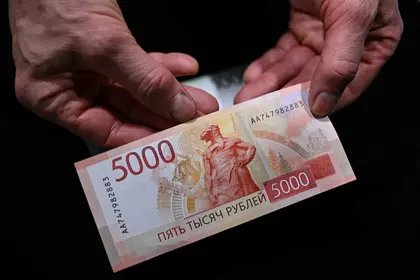Economists with whom Kyiv Post spoke indicated that the ruble’s current value of less than 100 to the US dollar, is due to a Kremlin political decision to show normalcy before Russia’s so-called presidential “elections” later this month. Following the elections, however, there is a high probability that the ruble will greatly decline in value.
“I expect the ruble to slide versus the dollar in the second or third quarter of 2024 by 15 percent or more. Reasons: in late summer of 2023, the Russian government decided to defend the ruble against the 100 ruble/dollar mark and introduced very costly measures, such as interest rate hikes,” said American economist Oleksandr Lugovskyy.
JOIN US ON TELEGRAM
Follow our coverage of the war on the @Kyivpost_official.
The Russian ruble, which a year ago went for 76 to the dollar, is currently going for 91.36.
Late in the summer of 2023, “the Russian government decided to defend the ruble against the 100 ruble/dollar mark and introduced very costly measures, such as interest rate hikes,” Lugovskyy said, continuing that: “There is no economic significance to the 100-dollar mark, indicating that the decision is political.”
The idea that there will be a significant slide in Ruble value, after elections, was echoed by Lugovskyy’s brother, economist Volodymyr Lugovskyy, a professor of economics at Indiana University, who said “I am not alone in expecting the ruble to fall badly within a month or so after ‘elections,’” continuing that “It had to happen long time ago, but the ruble was kept at 100 at a great cost for the Russian economy for political reasons.”

North Korean Troops Face Major Losses in Kursk: The Cost of Russia’s Desperation
Vladimir Putin’s “re-election” is “not in doubt,” according to commentary Mark N. Katz, a George Mason University Schar School of Policy and Government professor, told Newsweek, which would mean that in the near-term, rapid changes in the ruble may be at hand, if the economists’ projections prove to be correct.
For Moscow, it is not only the value of the ruble that should be robbing Kremlin economists and common citizens of sleep as, there are “many spheres of the Russian economy are in decline and the state of the Russian economy may further worsen if the US and EU keep applying target imports against critical imports,” Professor Lugovskyy said.
The ruble received some relief on Wednesday as oil prices buoyed its decline. However, ongoing Ukrainian drone attacks on Russia’s oil refineries will cause more long-term pain for Russia’s economy, as it cuts the state’s ability to refine what the US Treasury Department estimated, in 2023, was 23 percent of the Russian national budget – oil revenues.
Bloomberg has estimated that 12 percent of Russia’s oil output was lost this week due to the Ukrainian drone attacks on Russia’s oil refineries.
“The Russian government is facing steep hurdles to fund their budget (including large military expenditures),” Volodymyr Lugovskyy said, “they will likely end up depreciating the ruble after Putin begins his new presidential term and political pressure to keep the ruble below the 100 mark (vs the dollar) subsides.
Russia, currently the most sanctioned country in history, faced rapid devaluation of its currency following the fall-scale invasion of Ukraine in 2022, but has since brought the ruble under control through several emergency measures, including the heavy use of foreign currency reserves to keep the Russian currency afloat.
You can also highlight the text and press Ctrl + Enter






